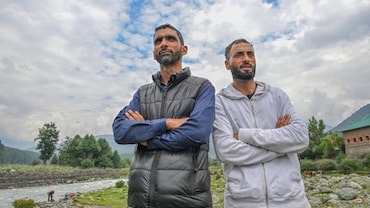Life-Lessons From A Fictional Teacher
How Nikumbh Sir from the film Taare Zameen Par left an indelible mark on the soul of a family
 Illustration by Priya Kuriyan
Illustration by Priya Kuriyan
It began with Avik’s innocuous online post on his reaction to watching Taare Zameen Par for the umpteenth time, and his tryst with dyslexia. Then his wife, Saswati, responded. And then Tinni, their daughter—the only one actually diagnosed with dyslexia—wrote about her troubles and triumphs. Together, the three narratives come together as a tribute to some incredible teachers and to the best teacher ever—life!
Papa Ghosh
My family likes watching some films again and again and again. So it was with Taare Zameen Par today. Tinni, our daughter, insisted on watching it for the 100th time and was eagerly joined by my physiotherapist, Anup. Since the TV was in my room, I was compelled to watch too.
The first time I took Tinni to watch Taare Zameen Par, it was with the assumption that it would resonate with her, given her own challenges. And I remember sitting in the dark and crying copiously. Not because I found the film touching, which of course I did, but more so because it was my story. I was Ishaan Awasthi. I had been through every humiliation and embarrassment that a child with dyslexia suffers. Suffered, at least, when nobody had heard of that disorder. Adding to my trauma were two very smart and successful sisters, prompting my parents to mostly try and hide a rather deficient son. I was a disaster in school. Teachers were uniformly unkind and retribution at school and home was often violent.
I had to wait until Jadavpur University (JU) to meet my Ram Shankar Nikumbh. Actually, not one, but several of them. Teachers who helped me believe in myself. Who were infinitely patient with my queries and confusion. Who gave me enough space to make my own mistakes. Who ultimately grew to be my guiding light, my moral compass, my first point of reference and my last resort.
Sajni-di, who I know still reads and likes every Facebook post of mine and seldom misses out on leaving a kind word, not just for me but for every student of her’s on the platform. Jasodhara Bagchi and Arup Rudra, who believed in me more than I did. Mihir-da and Malini-di, whose strange admixture of sternness and kindness was most endearing. The late Ranajay Karlekar, who continued to inspire even in his absence. Swapan Chakravorty, who challenged us to become more than what we were. Sheila Lahiri Choudhury, whose kindness far exceeded what her truant students deserved. And many others who tolerated our extremism, a lot of which seems intolerable in hindsight.
I remember them more often than they can imagine—caught at a traffic light on my way home from office, staring hesitantly at a flickering computer screen, reading disturbing headlines in the morning, when Tinni asks me a question to which I have no answer. At the bookstore, when a name from the past stares back at me from an arty book cover. And most certainly when I see a gaggle of noisy youngsters discussing life, universe and everything else with the confidence that only the company of great teachers can gift them.
This is not a tribute. This is me flashing my badge of honour in public.
—Avik Ghosh
***
Mama Ghosh
Saswati, responding to Avik about how dyslexia wasn’t the only challenge a youngster could face
I would have loved to be your friend when you think you had a horrid childhood. I might have managed academics well, was not as awkward as you were, had a few friends in school and in the neighborhood but, I guess, we would have got on well ...
Besides Baba, I had no other Ram Shankar Nikumbh. By the time you were spreading your wings at JU, I had retreated into a shy, reclusive and awkward shell—one who was hesitant about everything, except possibly, studies and music. Baba had left us by then.
 Ishaan Awasthi (left) and Ram Shankar Nikumbh (right) in a still from Taare Zameen Par (Screenshot courtesy YouTube)
Ishaan Awasthi (left) and Ram Shankar Nikumbh (right) in a still from Taare Zameen Par (Screenshot courtesy YouTube)
My khul gaya aasman moment came much, much later ... Only when I met all of you at 4, Chowringhee Square [the offices of The Statesman newspaper]. Then came Voices [the newspaper’s school supplement], with all the children and their love and warmth. Then you happened to me, and then traipsed in baby Tins ...
Life is great. It lets stars descend at your doorstep with so much compassion. I bow to life in gratitude. For being my Nikumbh Sir.
—Saswati Ghosh
***
Teen Ghosh
And then Tinni, their daughter, who fought more than just dyslexia in school, narrates her experience of angels and demons!
Taare Zammen Par resonates with me so very much. I have had many challenges since childhood—dyslexia has been one of them. I see myself in Ishaan. Each day has been a struggle—a struggle to survive and to cope.
As days passed, I too found my Nikumbh Sir—in Piyali Ma’am at Akshar. She has always been there for me, like an ever-alert angel.
Ma’am, if you are reading this, I just want to say that Ishaan was not the only lucky child to have found his Nikumbh-Sir moment. I, too, am lucky, a girl with so many challenges and with one Piyali Ma’am teaching her to cope with them.
I will be ever grateful to those wonderful people—Babli Aunty in Divyayan, Miss Budhiraja in that horror of a year at Birla High, all my teachers at Akshar, my guru-ji, Bibhuti Sir, who guided, helped, supported, loved and nurtured me and have never dismissed me as a ‘special’ kid.
There has always been Neena Ma’am and Noni Ma’am, without whom my Divyayan and Akshar journeys wouldn’t have been possible and, if possible, much, much tougher!
There was another angel called Dr Neena Ghose. She made sure that my arrival from the adoption home to the Ghosh madhouse was as smooth as possible. She did not discard me as a lost case; instead there were days when she arrived even thrice a day to see that I survived my many ailments. Thank you, Neena mashi.
I remember vividly an incident of me being dyslexic. I was learning Rabindrasangeet at a reputed school at that time. In my primary third year, the teacher failed to understand that I had trouble remembering words, not tunes. He was quite unpleasant about it in front of everyone.
I came back home, howling. As I told my mother all that had happened, she went back to the school with me, met the teacher and spoke to him, requesting him to come and watch Taare Zameen Par with us. She explained to him what dyslexia was. And that it was neither a crime nor stupidity.
This is a shout-out to all those who have not shunned me for my challenges. Here is one sister of Ishaan Awasthi writing to her Nikumbh Sirs. Thank you.






